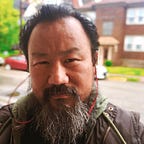Kobe Was an All-Star and His Game Gave My Family the Language We Needed
For one Korean American writer, the late athlete bridged generational and cultural divides
 This year I will turn 50. When the topic comes up, my mother shakes her head in disbelief. I shake my own head, too. If I’m 50 that makes my brother 54, my dad 82, and my mom 79. Both in the final chapters of their lives.
This year I will turn 50. When the topic comes up, my mother shakes her head in disbelief. I shake my own head, too. If I’m 50 that makes my brother 54, my dad 82, and my mom 79. Both in the final chapters of their lives.
Today is January 27, 2020. It would normally be an insignificant weekday. I am nearly 2,500 miles away from them, my parents and brother. It is gray and 30 degrees outside, the usual shitty weather that Pittsburgh graces us with every other day. This year I will turn 50 and I am crying watching Ice Cube on ESPN, his voice cracking, talking about Kobe Bryant.
I am waiting for my mom to call me from L.A. to check in on me, to ask me how I am, to sigh as she does when she’s trying to find words that I will understand — she tells me to go to church. Just as she did on November 11, 1991, when I was a student at UC Irvine, when Magic Johnson announced that he was HIV-positive. She called me as I was crawling back into bed in my dorm to ask, “Are you okay?”
I am almost 50 and I’m still waiting to tell my mom that I am lost, that I am afraid of the days that keep disappearing behind me. I…
